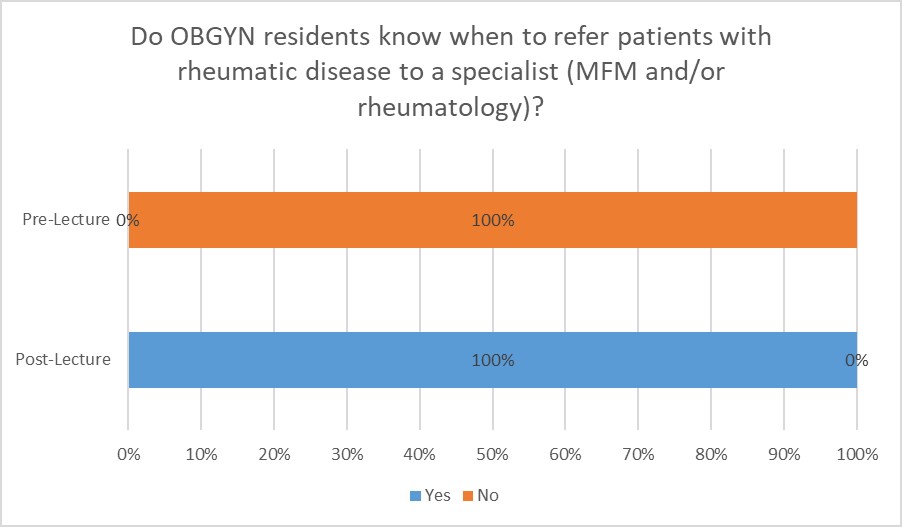Session Information
Date: Tuesday, October 28, 2025
Title: (2195–2226) Reproductive Issues in Rheumatic Disorders Posters
Session Type: Poster Session C
Session Time: 10:30AM-12:30PM
Background/Purpose: Contraception management, preconception planning, and prenatal, antenatal, and postnatal care vary significantly in clinical practice for patients with rheumatic disease. Rheumatologists recognize the need for efficient referral systems to facilitate collaboration with reproductive health providers; however, they may not have professional relationships with obstetrician-gynecologist (OBGYN) colleagues and an established referral pathway. We conducted a needs assessment at our institution, including surveys of OBGYN residents and OBGYN generalists, to better understand their access to resources and referral patterns to maternal-fetal medicine (MFM) and rheumatology. This quality improvement project aims to improve collaboration between women’s health providers and rheumatologists to improve the reproductive health care of patients with rheumatic disease within our health system.
Methods: Online REDCap surveys were administered to OBGYN residents (Nf16, 9 pre-intervention, 7 post-intervention) and OBGYN generalists (Nf8). OBGYN residents and generalists were asked about resources and access to specialist (MFM and rheumatology) assistance when managing patients with rheumatic disease, when they refer patients to MFM and rheumatology, and preference for electronic versus in-person rheumatology consults. Our primary intervention was a lecture on reproductive health in rheumatic disease for OBGYN residents. Resident survey results were collected pre- and post-intervention and analyzed using Stata 18 software.
Results: Post-intervention data showed an increase in the percentage of OBGYN residents who feel they have the knowledge, skillset, and resources to manage patients with rheumatic disease during pregnancy, from 0% to 57%. The percentage of residents who knew when to refer patients with rheumatic disease to MFM and/or rheumatology increased from 0% to 100%, and those who felt they could identify teratogenic medications in patients with rheumatic disease increased from 33% to 86% post-intervention. Preconception, OBGYN generalists report referring patients with rheumatic disease to rheumatology only (50%), or to both rheumatology and MFM (33%), and less often to MFM only (17%). When referring patients to rheumatology, 50% of generalists choose in-person consults and 50% choose both in-person and electronic consults.
Conclusion: We implemented an effective educational intervention that improved OBGYN resident knowledge regarding when to refer patients to rheumatology, with post-intervention data showing a 100% increase from baseline. The intervention also increased the percentage of residents who felt they could identify teratogenic medications. The OBGYN generalist survey served as a needs assessment and showed that generalists typically refer patients to rheumatology, or both rheumatology and MFM, preconception. Next steps in this quality improvement project include examination of bidirectional referral pathways, indications for referral to rheumatology and OBGYN, and access to each specialty for urgent and non-urgent indications, including contraception and high-risk pregnancy management, to streamline referral processes and improve collaboration.
To cite this abstract in AMA style:
Heard S, Vasudeva I, Hitt J, Gosselin J. Improving collaboration between rheumatology and OBGYN in the reproductive health care of patients with rheumatic disease [abstract]. Arthritis Rheumatol. 2025; 77 (suppl 9). https://acrabstracts.org/abstract/improving-collaboration-between-rheumatology-and-obgyn-in-the-reproductive-health-care-of-patients-with-rheumatic-disease/. Accessed .« Back to ACR Convergence 2025
ACR Meeting Abstracts - https://acrabstracts.org/abstract/improving-collaboration-between-rheumatology-and-obgyn-in-the-reproductive-health-care-of-patients-with-rheumatic-disease/


.jpg)
.jpg)